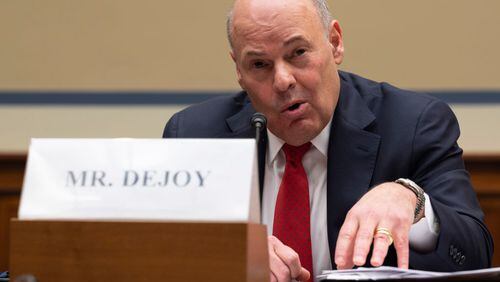Cathy Woolard’s forum was so packed that some of the voters who hoped she would be Atlanta’s first openly gay mayor were turned away. Inside, a rapt audience erupted into laughter when she interrupted a long-winded answer about the Atlanta electorate to note one group that can’t be overlooked.
“Gay people,” she said, “are really different.”
Metro Atlanta’s LGBT voters have long been a force in local politics, but the gay community is marshaling its growing political clout in new ways ahead of Tuesday’s runoffs to decide Atlanta’s next mayor and other big-ticket contests.
City Council president candidate Alex Wan and Fulton County Commission chair contender Keisha Waites are both openly gay. And Woolard, who finished a strong third in her quest for mayor, could play queenmaker with a late endorsement in the race to lead the city.
That’s but a snapshot of the community’s increasing role in metro Atlanta votes. There were at least 16 lesbian, gay, bisexual and transgender candidates on the ballots in November’s vote, a collection of city races and special elections. The state’s only transgender elected official was among the victors.
Veteran LGBT leaders say it’s a sign that the political debate in the metro area is gradually being reshaped.
Many metro Atlanta candidates on the ballots this year, regardless of party, opposed “religious liberty” measures that critics see as discriminatory toward same-sex couples. And most assiduously courted gay voters by reaching out to LGBT power brokers and advocating for causes important to the gay community.
“This was a moment for the LGBT community,” said Matt Hennie, the editor of Project Q Atlanta, a publication that caters to LGBT readers. “LGBT voters are showing their political might in terms of dollars and sweat equity and getting out and working for the campaigns.”
Nowhere is that more evident than the vote for Atlanta mayor, where the two finalists are scrambling for the gay vote. They’ve attended LGBT forums, crafted policies to address rising HIV infection rates and pledged to fight discriminatory measures in the state Capitol.
It’s a seismic shift from even a few years ago. Councilwoman Mary Norwood ran for mayor in 2009 and was the most strident supporter of gay rights in the runoff; in the 2017 contest she competed against a field full of candidates who championed the same cause.
Among them was Woolard, who became the first openly gay elected official in Georgia history when she was elected to the City Council in 1997. She used that platform to write Atlanta’s anti-discrimination ordinance.
“Representation matters. I know I leveraged my relationships in my positions to get things done,” said Woolard, who endorsed Norwood the day after the forum. “We’re at a tipping point for change. And it matters.”
‘A nonissue’
That ripple effect was on display at this year’s Atlanta Pride Parade, which marched straight through the heart of Midtown Atlanta.
Not too long ago, the parade was at best an afterthought for politicos — at worst something to be shunned. Now, it's become a must-attend for every serious Democratic contender for office.
A pink-shirted U.S. Rep. John Lewis was celebrated with a hero’s welcome. Atlanta Mayor Kasim Reed held court from atop a towering float. Just about every candidate for Atlanta office marched down Peachtree Street, tossing candy and high-fiving folks along the route.
So did both Democratic contenders for governor — former House Minority Leader Stacey Abrams and ex-state Rep. Stacey Evans — who walked the street alongside supporters. It’s believed to be the first time a credible candidate for governor participated in the parade.
It’s also a matter of crude electoral politics. The demographics of LGBT communities are hard to pin down because the Census Bureau does not ask people about their sexual orientation, but there’s little doubt that LGBT voters have an outsized electoral influence.
A 2015 analysis of Gallup survey data found about 4 percent of metro Atlanta's residents identified as gay, lesbian, bisexual or transgender. Some analysts, including veteran Democratic pollster Beth Schapiro, say the LGBT vote accounts for at least 10 percent of registered voters in the city.
Despite that political might, gay candidates have a checkered record at the ballot box. In the 2013 elections, Project Q reported, six LGBT candidates ran for office and only one — Wan, who was elected to a second term on the Atlanta council — won his race. Four years earlier, about 15 LGBT candidates ran — and five were elected.
In this year’s contest, Woolard urged voters to keep a particularly close eye on Wan’s race. That’s because his defeat could mean the first time in about two decades there are no LGBT members of the city council. Kirk Rich, an openly gay commercial real estate broker who ran to replace Wan, lost his race in November.
Still, some say the community’s role has increased so much that some LGBT leaders say it might have reached a turning point.
Charlie Stadtlander said that a few years ago, gay candidates often made their sexual orientation a centerpiece of their campaign — and gay voters sometimes made it a defining factor behind their vote.
Now, he said, “being gay is no longer a litmus test for who we vote for.”
Case in point: In his unsuccessful November bid to become one of the first openly gay members on Atlanta’s school board, he noted with a chuckle, his opponents’ financial disclosures were dotted with LGBT couples.
“Gay candidates are getting looked at on their merits. And when you look at these candidates on their merits, you discover they’re mostly awesome candidates that just happen to be gay,” he said. “It’s becoming more of a nonissue, and gay voters feel more comfortable crossing over and voting for a straight candidate.”
Growing clout
The community’s political muscle in Atlanta stands in contrast with the gay rights movement’s more incremental gains on the statewide stage.
The long-sought goal of gay rights activists to pass hate-crimes legislation to protect victims who are singled out because of sexual orientation has failed to gain traction.
Every leading Republican contender for governor has pledged to sign a religious liberty measure if elected. And this year’s legislative session ended in a stalemate after Senate conservatives sought a measure that would have permitted some private adoption agencies to refuse to place children with same-sex couples.
At the same time, gay rights groups have allied with business boosters to fight bills they see as discriminatory, winning over Gov. Nathan Deal in the process. He vetoed a religious liberty measure last year, and his administration warns an attempt to revive it could threaten the city’s pursuit of Amazon’s second headquarters.
Georgia judges didn’t engage in widescale acts of defiance after the U.S. Supreme Court’s 2015 ruling legalizing same-sex marriage that threw other judicial systems across the South into chaos.
And state lawmakers seem likely to pass legislation next year to update an adoption code that doesn’t include a provision that would allow private charities to refuse to place children with gay couples.
At the Georgia Capitol, there are now at least four LGBT lawmakers, and they soon could be joined by a fifth. De’Andre Pickett, the chief executive of a charter school in College Park, is in a runoff Tuesday for a state House seat.
The first was Karla Drenner, who won election to the Georgia House in 2000. She gives credit to a surprising source for the increased LGBT clout in Georgia politics: the Republican governor.
“And I didn’t expect that when Governor Deal was first elected,” she said. “He recognized that the economic growth for the state of Georgia was a good thing, and in order to do that you have to embrace diversity.”
Many of the candidates were influenced by national dynamics, too.
Reese McCranie, an openly gay candidate who ran for a Fulton County Commission seat, said Donald Trump’s election as president was a “clarion call” for LGBT candidates, women and minorities to run as agents of change against the White House.
“You’re going to see more and more people in the gay community to offer themselves up for public service,” he said. “And they’re going to offer a much-needed voice in state politics.”
Drenner said the next frontier could involve more LGBT candidates running for statewide elected office and other posts outside of metro Atlanta.
“In a community like Atlanta, where you’ve had openly gay people get elected, it’s back-page news,” she said, “but outside the city, it’s still a political issue.”
‘An apocalyptic event’
Inside the city, the LGBT community could prove decisive in the race between Councilwomen Keisha Lance Bottoms and Norwood to lead Atlanta.
Tharon Johnson, a Democratic operative who managed Reed’s 2009 campaign, said the “easiest path to City Hall will mean being an ally” to the gay rights community. And both Bottoms and Norwood have put outreach to the LGBT communities at the center of their campaigns.
Norwood said she would use her pulpit to promote the Atlanta anti-discrimination ordinance to state lawmakers, and she would back a “concerted effort” to find and provide services for homeless gay youths living on Atlanta’s streets. She’d make the city’s liaison to the LGBT community a Cabinet-level position.
Bottoms has similar proposals. At a crowded LGBT forum in Midtown, she praised the anti-discrimination ordinance and said she’d put a message of tolerance and inclusivity at the center of her economic policy.
“As a city,” she said, “we have to push and make our position known: that we are not a discriminatory city, that we welcome families of all kinds at the city of Atlanta.”
For some gay rights leaders, there’s an undercurrent of caution.
Drenner, for one, remembers in the early 2000s being warned not to get involved in children’s issues because of fears that gays would “convert kids.” The mother of two said no one bats an eye now when she advocates for children’s causes.
Still, she said, she’s not ready to call the wave of gay candidates — or the three LGBT figures at the center of Tuesday’s vote — a watershed moment.
“It’s exciting, but I’m always waiting for the other shoe to drop,” she said. “Some of my friends in the Legislature will see that trifecta as an apocalyptic event. I’m always conscientiously joyful to see the landscape of equality evolve but mindful that I still live in a sea of red.”
Never miss a minute of what’s happening in Georgia Politics. Subscribe to PoliticallyGeorgia.com.








